AI workload management
AI workload management revolutionizes the way businesses handle and distribute tasks, ensuring optimal efficiency, resource utilization, and employee productivity. By leveraging artificial intelligence, organizations can automate task allocation, monitor performance, and balance workloads across teams or systems, reducing bottlenecks and improving overall operations.
One of the core features of AI workload management is intelligent task allocation. AI analyzes factors such as task complexity, deadlines, employee skills, and current workloads to assign tasks dynamically to the most suitable individuals or teams. This ensures that tasks are completed efficiently while avoiding overloading any single team member, promoting balanced workflows.
Another key benefit is real-time monitoring and adjustment. AI tools continuously track task progress and resource availability, making on-the-fly adjustments to maintain smooth operations. For example, if one team encounters delays, AI can redistribute tasks to ensure deadlines are met without compromising quality.
Predictive analytics in AI workload management allows businesses to anticipate future demands and prepare accordingly. By analyzing historical data and identifying patterns, AI can forecast workload peaks and allocate resources proactively, ensuring readiness for busy periods.
Automation plays a significant role in reducing repetitive tasks. AI workload management systems can automate routine processes, such as data entry, report generation, or ticket routing, freeing up employees to focus on more strategic or complex activities. This enhances productivity while reducing burnout caused by mundane work.
Scalability is another advantage of AI workload management. As businesses grow and workloads increase, AI systems scale effortlessly to handle higher volumes without compromising efficiency. This adaptability is crucial for organizations aiming to expand without significantly increasing operational costs.
For customer service teams, AI workload management improves responsiveness and customer satisfaction. By analyzing incoming inquiries and distributing them based on agent expertise and availability, AI ensures customers receive timely and accurate assistance.
Integration with existing tools, such as project management or CRM platforms, further enhances the capabilities of AI workload management. Centralizing data and workflows allows for a seamless user experience and improved decision-making.
In conclusion, AI workload management transforms task distribution and resource optimization, empowering businesses to operate more effectively. By reducing inefficiencies, automating repetitive tasks, and promoting balanced workflows, AI ensures organizations can achieve their goals while maintaining high employee satisfaction and customer service standards.

- Articles
-
 Amy
Amy
- 7 min read
